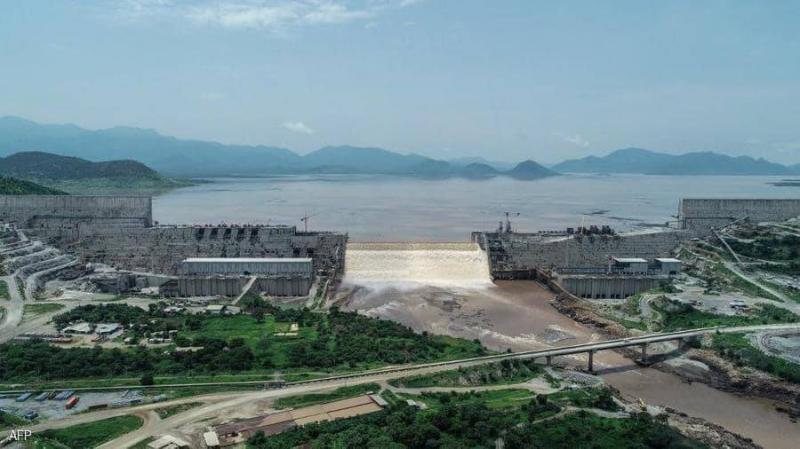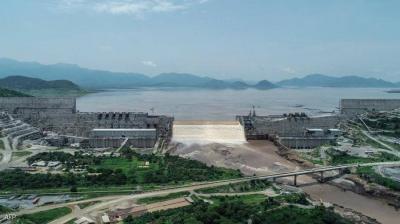Amidst a crisis that remains stagnant, an informed Egyptian source revealed that negotiations regarding the Grand Ethiopian Renaissance Dam (GERD) have halted, with no complete and clear proposals available for discussions to resolve the crisis. The source mentioned that there are "some ideas, but they do not rise to the level of an initiative or proposal." The source, who is knowledgeable about the negotiation file, spoke to "Sky News Arabia" about the Egyptian stance regarding the GERD crisis, handling the dam's second filling, and the possibility of a breakthrough in the situation and a recommencement of negotiations.
The informed Egyptian source affirmed that Egypt's position on the GERD remains firm and unchanged, emphasizing the need to reach a comprehensive binding agreement for filling and operation based on a specific mechanism to resolve and settle any disputes. The source highlighted the importance of achieving a "binding agreement stipulating that in the event of extended drought periods, Ethiopia would be obligated to release the necessary stored water quantities to combat drought in Egypt and Sudan," adding, "the agreement ensures coordination between the two sides, especially during periods of severe drought."
In response to the dangers of the second filling occurring without agreement, the source revealed, "We can handle the second filling, but if it occurs without an agreement, it will diminish the High Dam's capacity to face drought periods. However, if there is a binding agreement, the agreed-upon water quantities will be released, enabling the dam to cope better."
The source stressed that "Ethiopia's first and second fillings without reaching a binding agreement are considered unilateral and contrary to the 2015 principles agreement." Ethiopia has repeatedly confirmed its intention to proceed with the second filling of the dam, estimated at 13.5 billion cubic meters, at its scheduled time in July, raising concerns for Egypt and Sudan regarding a potential reduction in their water shares.
Regarding the proposed Egyptian scenario given Ethiopia's confirmation of the second filling, the informed source underscored that "Cairo is moving on all levels and in all directions and has not paused for a moment to protect its water security, constantly assessing the situation."
In this context, Egypt is prepared to resume negotiations based on the mediation of the international quartet, which includes the United States, the European Union, the United Nations, and the African Union, a proposal previously suggested by Sudan as a guarantee to restart discussions.
The source explains that "the presence of technical and legal experts from various international parties is a crucial factor for the success of any negotiations, unlike relying solely on African mediation, which is seen as a waste of time and an extension of talks without results."
Regarding the American position on the dam crisis, the source stated, "It is possible to expect a different and strong American stance on the dam crisis, as changes are occurring in light of the visits made by the U.S. envoy to the Horn of Africa."
Last week, the U.S. envoy Jeffrey Feltman completed a tour visiting the three countries: Egypt, Sudan, and Ethiopia, during which the U.S. State Department issued a statement warning the conflicting countries against failing to reach an agreement and emphasized the impact of this on resuming negotiations.
When asked about the possibility of resolving the crisis and restarting negotiations among the three countries, he replied, "There are moves being made by the African Union and the American side, and a breakthrough might occur suddenly, leading to negotiations."
Recently, "The Reporter Ethiopia" mentioned that the current African Union chairperson, President Felix Tshisekedi of the Democratic Republic of Congo, proposed a new initiative during his visits to the three countries aimed at resuming negotiations, calling for an initial agreement on the dam's filling processes. In response to the African proposal, the Egyptian source emphasized that, "There are still no complete and clear proposals to address; perhaps there are some ideas, but they do not rise to the level of an initiative or a proposal."
Previously, Ethiopian Minister of Water and Irrigation Seleshi Bekele noted during a consultation session organized by the Ministry of Foreign Affairs and the Public Contribution Coordination Council to support the GERD that "the construction percentage of the dam has exceeded 80%."
In contrast, the Egyptian Ministry of Foreign Affairs emphasized last Thursday its rejection of any "unilateral measures that Ethiopia might take regarding the GERD," including the continuation of unilateral filling during the upcoming flood season this summer.
### Three Scenarios
In earlier televised statements, Water Resources and Irrigation Minister Mohamed Abdel Aty outlined three potential scenarios for Egypt in the event of the second filling of the dam, as reported by local media.
The first scenario: A high flood occurs with safe levels in the High Dam's reservoir sufficient to absorb the shock of the second filling.
The second scenario: A medium flood occurs, which will reduce the amount of water being stored by Ethiopia.
The third scenario: The worst-case scenario, where drought coincides with the filling of the GERD.
He stated that filling the GERD represents a shock, as it would reduce the amount of water reaching Egypt, especially if it coincides with drought conditions.




